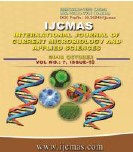


 National Academy of Agricultural Sciences (NAAS)
National Academy of Agricultural Sciences (NAAS)

|
PRINT ISSN : 2319-7692
Online ISSN : 2319-7706 Issues : 12 per year Publisher : Excellent Publishers Email : editorijcmas@gmail.com / submit@ijcmas.com Editor-in-chief: Dr.M.Prakash Index Copernicus ICV 2018: 95.39 NAAS RATING 2020: 5.38 |
The success of social insects is governed by remarkable levels of phenotypic plasticity displayed by colony members which is mediated by epigenetic inheritance. Waddington originally defined epigenetics as the study of the mechanisms that led to the development of a particular phenotype from a given genotype. Social insects have been primary model systems used for understanding the importance of insect DNA methylation. Epigenetic states are initiated by some type of environmental stimulus. DNA methylation is recognized as an important chromatin modification providing structural integrity and proper regulation of the genome for many species. In animals DNA methylation typically occurs at CG sites, established de novo by DNA methyl transferase 3 (DNMT3), and maintained by the methyl transferase DNMT1. The sequencing of the honeybee genome led to the discovery of a fully functional methylation system and caste determination has been found to involve epigenetic regulation. Furthermore, Cytosine methylation was reported to play a key role in the learning and memory processes of honey bees. Moreover, dynactin p62 is more highly methylated in worker honeybees than in queens, and queen larvae expressed higher dynactin p62. Zootermopsis nevadensis nuttingi (Termopsidae) also exhibits a high level of DNA methylation, which is helpful in regulating phenotypic plasticity, as for other eusocial Hymenoptera. Fertile queens and sterile workers are alternative forms of the adult female honeybee that develop from genetically identical larvae following differential feeding with royal jelly. Thus nutritional factors have been reported to control the reproductive behaviour in social insects. Nutritional input, acts as an agent of epigenetic modifications leads to different developmental fates, with massive implications for reproductive and behavioral status. In Apis mellifera DNA methylation is a key component of an epigenetic network controlling a most important aspect of eusociality, the reproductive division of labor. Social insects in particular are exceptionally promising models in DNA methylation studies because of the presence of outstanding phenotypic plasticity and ample potential for genomic imprinting. This concern of DNA methylation will grow with the continued exploration of insect genomic data and the continued sequencing of insect DNA methylomes.
 |
 |
 |
 |
 |